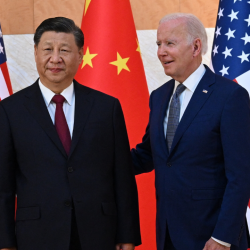G20 breathes new life into UN climate talks

A pledge by G20 leaders, whose countries account for most global CO2 emissions, to pursue the most ambitious target against global warming breathed new life into fraught UN climate talks in Egypt on Wednesday.
Analysts and campaigners welcomed the final communique from the G20 meeting in Bali, Indonesia, which comes as negotiators in Egypt are struggling to agree on key issues before COP27 is supposed to end on Friday.
“The positive signals from the G20 summit should put wind in the sails of the climate talks in Egypt, which are entering their final days,” said Ani Dasgupta, CEO of the World Resources Institute.
The Group of 20 text promises to “pursue efforts” to curb global warming to 1.5 degrees Celsius above pre-industrial levels, a safer limit according to scientists.
“The outcome from Bali has been surprisingly positive,” said Fionna Smyth, head of global policy and advocacy at Christian Aid.
Give their share of global emissions, “what they do will play significant role in how we tackle the climate crisis,” she said.
– ‘Loss and damage’ –
The G20 document also addresses the main source of tensions at COP27 talks: a debate on funding to help developing countries least responsible for global emissions cope with here-and-now impacts of climate change, or “loss and damage”.
The communique urges all parties to “make progress on loss and damage at COP27, which is being held in Africa”, without laying out a specific way forward for the contentious issue.
After dragging their feet for years over concerns it would create a reparations mechanism, the United States and the European Union agreed to have loss and damage on the formal agenda at COP27.
But Western powers and a major group of developing nations allied with China presented widely different views of how to achieve this at the Red Sea resort of Sharm el-Sheikh.
The G77+China bloc of more than 130 developing nations presented a document saying the need for a special “loss and damage” fund was “urgent and immediate”.
The United States and the European Union have suggested that expanding current channels for climate finance might be a more efficient approach than creating a new one.
The G20 statement also reiterated a commitment to phase out “inefficient” fossil fuel subsidies over the medium term, while also saying the leaders recognise the importance of the transition to renewable energy and pledge “efforts towards the phasedown of unabated coal power”.
“Unabated” refers to emissions from coal-fired power plants that are not syphoned off to prevent them from entering the atmosphere.
The document gives countries “a clear mandate to make progress at COP27 on all issues, including loss and damage, and commit to accelerate the deployment of clean energy,” said Luca Bergamaschi, co-founder of Italian climate think tank ECCO.
Others, however, said the G20’s statement did not amount to much progress.
Avinash Persaud, special envoy on climate finance to Prime Minister Mia Mottley of Barbados, said G20 nations could unlock more financing from multilateral development banks and “prime the pump” for investments in energy transitions.
“They have missed the opportunity to deliver on that today, and we are running out of time,” Persaud said.
By AFP






